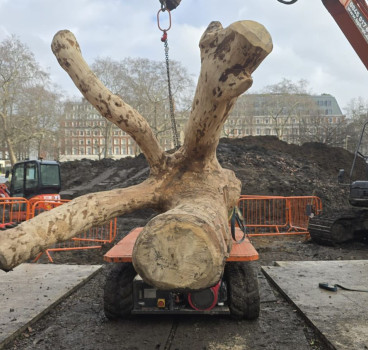How public scepticism is reshaping urban development
In recent years, a growing trend has emerged that is challenging the very foundations of urban planning and development worldwide. Ordinary citizens across the globe are increasingly losing trust in governments and local authorities to safeguard the interests of their communities. This scepticism is not confined to any one country or region - it is a global phenomenon that has profound implications for the way cities are built and how communities evolve, writes John Ridgeway.
A recent survey in the United States paints a stark picture of this growing movement. According to data from a national survey conducted by Consensus Strategies, a significant 73% of respondents oppose new development in their communities. Furthermore, 71% of those surveyed believe that the close relationships between developers and elected officials have created an inherently unfair planning and zoning process. In addition, 57% of respondents rated the performance of their local governments in managing new development as “Fair to Poor.” These figures reveal a deep-seated public cynicism that goes beyond zoning regulations and approval timelines, with residents feeling that their voices are being sidelined in favour of corporate and political interests.
The roots of this growing distrust can be traced to several factors. Firstly, there is a widespread perception that the planning process is biased in favour of developers. Many people believe that behind-the-scenes relationships between elected officials and property developers lead to decisions that benefit a select few at the expense of the broader community. This is not merely a matter of public opinion - studies and surveys have repeatedly shown that people are sceptical about whether the planning and zoning approval processes are conducted fairly.
Moreover, residents often feel that the impact of new developments on their neighbourhoods is not adequately considered. Whether it’s the strain on local infrastructure, the loss of green spaces, or the potential for overdevelopment, communities are increasingly worried that rapid urban growth is undermining the very character and quality of life they cherish.
A global problem
While the survey data above comes from the United States, similar trends are being observed globally. In the United Kingdom, for example, studies conducted by the Royal Town Planning Institute have indicated that many residents feel disconnected from the planning process. Surveys reveal that a large portion of local communities believe their local councils prioritise economic gain over preserving neighbourhood character and heritage. With rapid urbanisation and the rising cost of living, UK residents have become more protective of their communities, viewing large-scale developments with increasing suspicion.
In Australia, public opinion mirrors these concerns. Reports from the Australian Housing and Urban Research Institute (AHURI) indicate that community opposition to major development projects has surged in recent years. Many Australians worry that new developments lead to gentrification, displacing long-standing residents and eroding the cultural fabric of their towns and cities. The distrust is compounded by perceptions of insufficient community consultation, with local governments sometimes accused of fast-tracking approvals without fully engaging with residents.
Asia, too, has seen its share of development-related controversies. Cities like Hong Kong, Tokyo and Singapore are at the forefront of urban innovation, yet rapid development has sparked significant public backlash. In Hong Kong, for instance, a recent poll found that nearly 62% of respondents opposed certain redevelopment projects, citing inadequate community consultation and a loss of cultural identity as major concerns. Similarly, Tokyo, a city celebrated for its blend of tradition and modernity, has witnessed growing discontent among residents who feel that swift, top-down development projects neglect the social and historical context of local communities. In Singapore, while the government’s planning processes are often lauded for their efficiency, there is an undercurrent of concern that rapid modernisation may come at the expense of community cohesion and heritage preservation.
Latin America provides yet another perspective on this issue. In Brazil, rapid urban expansion has frequently led to conflict between developers and local communities. In areas like São Paulo and Rio de Janeiro, large-scale developments have sometimes resulted in the displacement of established communities, triggering protests and public outcry. These incidents have heightened awareness of the potential social costs associated with unchecked development and have led to calls for more inclusive planning processes that better represent local interests.
Europe, as a whole, is not immune to these challenges either. A 2021 survey conducted by the European Commission found that nearly 60% of Europeans are sceptical about the transparency and fairness of local development decisions. Respondents expressed concerns that the existing systems do not adequately represent the interests of ordinary citizens, often leading to projects that result in overdevelopment or unsustainable changes to the urban landscape.
The challenge for developers and local authorities
The mounting public distrust presents a formidable challenge for developers and local governments alike. For developers, gaining community support has become increasingly difficult. Even well-intended projects, designed to revitalise urban areas or boost local economies, can face intense opposition if the public perceives the process as unfair or exclusionary. In many cases, developers have been forced to go beyond mere regulatory compliance, engaging in extensive community outreach initiatives to build trust and demonstrate the benefits of their projects.
Local authorities, on the other hand, must contend with the dual pressures of managing economic growth and maintaining public confidence. When residents feel alienated by the planning process, it undermines the legitimacy of local governance and can lead to political instability. The challenge is to create a planning framework that is both efficient and inclusive - one that balances the need for development with the imperative to preserve community values and quality of life.

In response to these challenges, many cities around the world are rethinking their approach to urban planning. The traditional top-down model, where decisions are made by a select group of officials and developers, is giving way to more participatory methods. One such approach is participatory budgeting, which has gained traction in several European cities. This process allows residents to have a direct say in how public funds are allocated, fostering a sense of ownership and accountability.
In Australia, some local councils are adopting co-creation models, partnering with community groups to develop development plans that reflect the unique needs and aspirations of their neighbourhoods. These initiatives not only build trust, but also result in projects that are more responsive to local realities. For example, in cities like Melbourne and Sydney, participatory planning processes have led to the creation of more balanced developments that integrate green spaces, affordable housing, and community facilities.
Asia is also experimenting with innovative planning processes. In Singapore, urban planners are increasingly involving residents in the decision-making process through regular public consultations and digital platforms that facilitate community feedback. This collaborative approach helps ensure that new developments enhance rather than disrupt the urban fabric. In Tokyo, efforts to preserve historical districts while accommodating modern infrastructure are being supported by community-led planning initiatives that prioritise heritage conservation.
In Latin America, grassroots movements are pushing for greater transparency and public participation in urban planning. In cities such as Bogotá and Medellín, community groups have successfully lobbied for more inclusive development policies, resulting in urban projects that better serve local populations. These initiatives underscore the importance of empowering residents to shape the future of their communities.
The role of technology
Advancements in technology are playing a crucial role in addressing the trust deficit in urban planning. Digital platforms and social media have made it easier for residents to voice their concerns, share information and hold local authorities accountable. Open data initiatives are being embraced by cities to provide real-time information on planning decisions, environmental impacts, and economic benefits. This transparency not only demystifies the development process but also allows residents to monitor progress and contribute to the conversation.
Building Information Modelling (BIM) and other digital tools are also revolutionising the way urban planning is conducted. These technologies enable planners to create detailed, interactive models of proposed developments, which can be shared with the public for feedback. Such tools help demystify the technical aspects of planning, making it easier for non-experts to understand the potential impacts of a project.
However, rebuilding trust in the planning process will require a concerted effort from all stakeholders. For developers, this means not only delivering high-quality projects, but also engaging in meaningful dialogue with communities. Transparent communication, regular updates and a willingness to address public concerns can go a long way in changing perceptions. Developers must recognise that they are not just building structures, but also shaping the social and cultural fabric of communities.
Local authorities, too, have a critical role to play. Policymakers need to adopt more inclusive planning frameworks that prioritise community engagement and participation. This might involve revising zoning regulations, implementing stronger oversight mechanisms, or providing platforms for public consultation. By creating an environment where every voice is heard, local governments can foster a sense of shared responsibility for the future of urban development.
There are already examples of successful initiatives that have managed to rebuild trust and foster collaboration between local authorities, developers and communities. In Barcelona, Spain, a participatory urban planning project known as “Decidim Barcelona” has given citizens a direct role in shaping the city's development. Residents are invited to propose, debate and vote on urban projects, ensuring that the outcomes reflect the collective vision of the community.
Similarly, the city of Copenhagen, Denmark, has implemented a range of initiatives aimed at increasing public involvement in urban planning. From open data platforms to regular public meetings, Copenhagen has created a planning process that is transparent, inclusive and responsive to the needs of its residents. These examples demonstrate that when local governments prioritise collaboration and transparency, it is possible to overcome public distrust and create urban spaces that benefit everyone.
We can see therefore, that embracing an inclusive approach to urban planning is not only a matter of public trust - it also makes economic sense. Projects that are developed with community input tend to be more sustainable in the long term. They are more likely to meet the actual needs of residents, which in turn can lead to higher levels of satisfaction, lower maintenance costs and a more vibrant local economy. When residents feel invested in a project, they are more likely to support local businesses and contribute to a sense of community pride.
Moreover, inclusive planning can help address broader social issues. By ensuring that development projects incorporate affordable housing, public spaces and community facilities, cities can work towards reducing social inequalities by creating more equitable urban environments. In an era where the gap between the rich and the poor is widening in many urban centres, this approach is more critical than
Additional Blogs

4 Must-Follow Health and Safety Habits for the Modern Jobsite
The risks in modern jobsites are constant. Falls, chemical exposure and heat illnesses continue to injure workers across construction and related industries each year. The best way to reduce those...
Read moreDesigning multi-functional outdoor spaces through the power of Play Trees
Outdoor spaces are increasingly expected to do more than simply look good. They must invite interaction, support wellbeing, encourage movement and foster connection across generations. In schools,...
Read more

4 Ways Resilient Construction Gets it Right and 4 Ways It’s Still Falling Short
Climate change is becoming increasingly disruptive as the weather becomes stronger and more unpredictable. These circumstances are constantly pressuring the construction industry, which has had to...
Read more